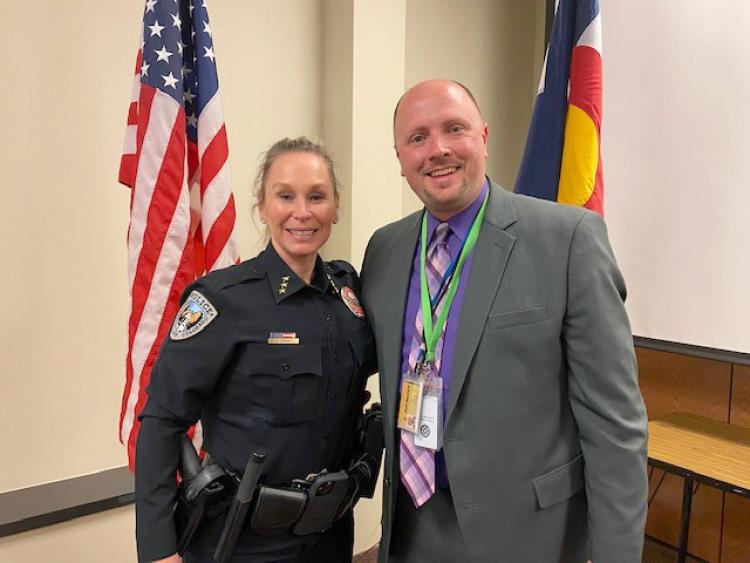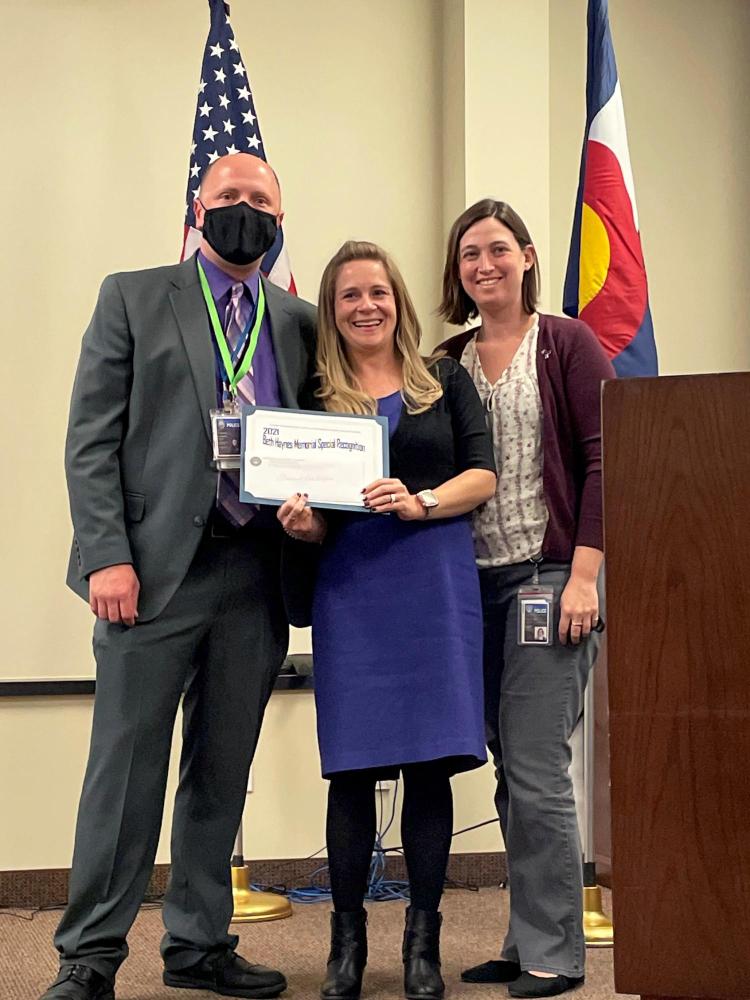CU sergeant awarded for bringing domestic violence lethality program to county

CUPD Chief of Police Doreen Jokerst with Sgt. Eric Edford
Officers at the University of Colorado Police Department (CUPD) now approach potential domestic violence calls using a coordinated community response model, asking a series of questions to screen victims and better identify danger levels.
The Lethality Assessment Program, or LAP, was pioneered by the Maryland Network Against Domestic Violence, and brought to CUPD by 10-year veteran Sgt. Eric Edford. It includes a carefully crafted and evidence-based list of questions police officers can ask when responding to calls.
The screening is designed to help officers quickly assess situations in a more trauma-informed manner. Officers also use the LAP screening to identify patterns of abuse, instead of focusing solely on an isolated incident that resulted in a call for help.
Victims identified as “high danger” can be connected with an advocate on scene or by phone for immediate access to resources. The LAP is unique in that it places significant emphasis on victims’ self-assessment in determining potential lethality risk. Officers can screen victims and are trained to incorporate victims' self-assessment when determining the level of danger.
Edford received special recognition at the Beth Haynes Memorial Award ceremony on Thursday by the Boulder County Domestic Violence Task Force, as part of Domestic Violence Awareness Month. Haynes was a Boulder Police officer killed in the line of duty while responding to a domestic violence incident in 1994.
“CUPD has been a leader in bringing innovative, effective tools to educate the community about domestic violence and to support victims,” said Anne Kelly, senior deputy district attorney in the 20th Judicial District. She noted many domestic violence victims never seek help, but increasing awareness of resources in this way may encourage more people to do so.

CUPD Sgt. Eric Edford receiving special recognition at the Beth Haynes Memorial Award ceremony Oct. 28, 2021, with OVA Director Jessica Ladd-Webert and Anna Brennan, CUPD’s embedded victim advocate, who receives support and supervision from Edford.
Edford––no stranger to helping survivors access available resources––helped establish the department’s embedded victim advocate position, which launched summer 2021. This embedded victim advocate co-responds with CU police officers, as well as follows up on reports to CUPD, to offer victims/survivors support and resources. The position is a collaboration between CUPD and CU Boulder’s Office of Victim Assistance (OVA).
“Communication from officers is a powerful tool,” said Anna Brennan, CUPD’s embedded victim advocate, who receives support and supervision from Edford. “It can have an impact when an officer expresses concern for a victim or survivor’s safety and encourages them to speak with a confidencial advocate.”
“Domestic violence, also known as intimate partner abuse, is happening in all communities, and CU is not exempt,” said OVA Director, Jessica Ladd-Webert.
The LAP was created to develop a stronger relationship between police and community/campus advocacy organizations. It’s designed to help prevent future violence by encouraging domestic violence incidents to be viewed as part of a larger pattern of power and control. This results in connecting more victims/survivors to community resources.
CUPD coordinated with the Castle Rock Police Department for LAP training during the height of the COVID-19 pandemic in 2020. Other agencies in Boulder County, including the Boulder Police Department, Boulder County Sheriff's Office and Longmont Police will receive training to implement LAP screening, or have already started the training process.
“Eric led the charge on this, and we wanted to recognize the courage it took to bring this to the county,” said Kelly, who helped launch the district attorney’s office’s Domestic Violence Acute Response Team. “This protocol gets at the heart of lethality behavior and connects victims with assistance. Early intervention with domestic violence victims is the most effective way to keep victims in the system, deciding to participate and receive help,” Kelly added.
CU Boulder Assistant Vice Chancellor for Public Safety and Chief of Police Doreen Jokerst says implementation of the assessment protocol could save lives. According to the National Coalition Against Domestic Violence, 72% of all murder-suicides involve an intimate partner. Oftentimes, victims are not aware of the level of danger they may face.
“I commend Eric for all he has done for survivors of domestic violence-related incidents and for leading this initiative in Boulder county,” Jokerst said.


